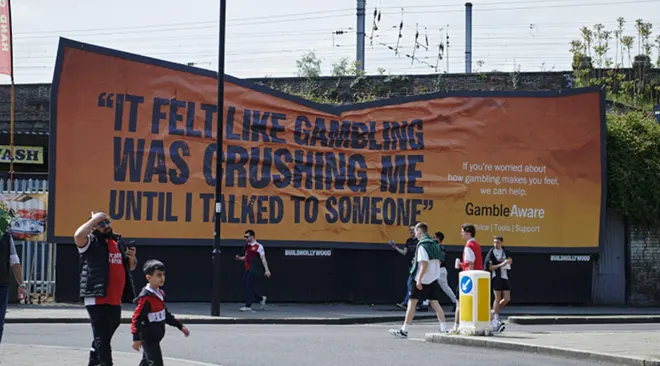 A survey conducted by Ipsos on behalf of GambleAware has revealed that 67% of those residing in the UK take issue with the prominence of gambling ads. As shown in the results, over 70% of respondents were in favour of harsher regulations being imposed on gambling ads shown on social media and television.
A survey conducted by Ipsos on behalf of GambleAware has revealed that 67% of those residing in the UK take issue with the prominence of gambling ads. As shown in the results, over 70% of respondents were in favour of harsher regulations being imposed on gambling ads shown on social media and television.
The majority of survey participants told researchers that merchandise that caters to children must not include betting logos. At the same time, 66% expressed concerns about the effect such promotions have had on British youth. Data from the survey supported these fears, as Ipsos has found that 24% of gamblers who wagered in the previous 12 months cited promotions tied to major sports events as the cause.
A focus was also placed on the effects that stigma and discrimination have on the behaviour of gamblers suffering from addiction. Nearly 40% of survey participants said they have not opened up about their wagering problems due to fears of stigma, discrimination, or feelings of guilt and shame.
All in all, the research suggests that individuals who suffer from gambling-related harm are hesitant to reach out. Of those who participated in the survey and have had experience with problem gambling, a mere 36% gave an affirmative answer to the question of whether they had spoken about gambling-related harm to someone. Moreover, almost a third had done so an entire year after they had first begun to face issues. We should also stress, however, that most individuals (76%) who mustered up the courage to reach out reported having felt better afterward.
Football Fans Are Also Critical of Gambling Sponsorships
 On Thursday, GambleAware also highlighted the results of last year’s National Supporter’s Survey. It involved 10,000 participants and revealed that the opinions of the general public and avid football fans are relatively similar as far as the topic of gambling ads is concerned. Three-quarters (73.1%) of football enthusiasts see the sponsorship of gambling surrounding football to be as problematic, while 66.2% are in favour of the government prohibiting gambling ads when it comes to football.
On Thursday, GambleAware also highlighted the results of last year’s National Supporter’s Survey. It involved 10,000 participants and revealed that the opinions of the general public and avid football fans are relatively similar as far as the topic of gambling ads is concerned. Three-quarters (73.1%) of football enthusiasts see the sponsorship of gambling surrounding football to be as problematic, while 66.2% are in favour of the government prohibiting gambling ads when it comes to football.
Given the above factors, GambleAware has issued a number of recommendations in its latest report dubbed “Gambling marketing in Great Britain: What needs to change and why.” Among the proposals is one calling for a blanket ban on gambling promotions in association with sports, including ads typically displayed on the clothing of players, merchandise, and stadiums.
A pre-watershed ban would also be beneficial, as emphasised in the report. Such a restriction would result in it being illegal for broadcasters, streaming services, and other companies to air gambling ads prior to the watershed. Last but not least, adverts surrounding gambling must display evidence-led warnings about the risks of gambling as well as clear information on where gamblers can find support, GambleAware has argued.
According to GambleAware’s Chief Executive, Zoë Osmond, gambling ad exposure results in the normalisation of wagering, and such sponsorships fail to inform consumers of the risks associated with gambling harm. This, she continued, was why GambleAware published its newest report.
Craig, an individual who has struggled with gambling harm, spoke about his personal experience with gambling promotions and how they have affected him. Namely, he stressed that such ads have made it difficult for him to watch football due to how much of it is “intertwined” with his gambling and that sponsorships are clearly visible on television. He ended by saying the following: “Much more needs to be done to help protect people from experiencing the same problems I did, and more regulation on gambling advertising in sports is urgently needed.”
- Author


